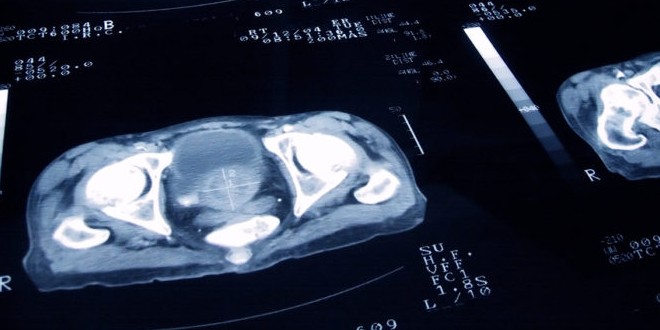Also known as: Benign prostatic hyperplasia (BPH)
Most men ignore a weakening urine stream; they watch as it changes from the fire hose of their youth to the dripping faucet of later years. They learn to push harder to force their urine out. That is, until the day they get a terrible cold and take a decongestant. Their nasal passages open up all right, but suddenly they can no longer pee.
Intro
Although the word “tumor” is very scary, there are actually two different types: benign and malignant. With respect to your prostate, benign tumors are non-cancerous and can interfere with your ability to urinate. A malignant tumor, by contrast, is prostate cancer — a disease so serious and so common, we’ve given it its own space on our website. For more on benign prostate tumors, read on.
What is it?
A prostate tumor is defined as any abnormal growth of the prostate, and can be either cancerous (see prostate cancer) or benign. When your prostate normally begins to enlarge around the time you reach fifty years old, you have a condition called benign prostatic hyperplasia (BPH). If your prostate continues growing, it presses against your urethra (which runs right through your prostate), and interferes with your urine flow. If untreated, you might not be able to urinate at all – a painful experience that requires medical treatment. Although BPH affects almost all men, only one-third will eventually require treatment.
Symptoms
Symptoms of BPH include: Frequent urination of small amounts, a weak or slow urine stream, feeling like you never fully empty your bladder, dribbling at the end of urination, urinary tract infections and, when severe, an inability to urinate.
Diagnosis
In order to diagnosis your BPH, your urologist will start with a rectal exam, in which he or she will feel your prostate to determine how large it is. Next, you may be asked to pee into a machine that measures the strength of your urine stream. Finally, your doctor may give an ultrasound of your bladder to determine how much urine is left after you urinate, which is known as your post void residual. Another way to measure your post void residual is to have a catheter inserted into your bladder, which will drain any remaining urine.
How is it acquired?
Benign prostatic hyperplasia (BPH) is the gradual, abnormal growth of the prostate gland that generally occurs in men over 50 fifty years old. Prostate enlargement is caused by testosterone, the hormone that gives you a deep voice, facial hair and libido. Though some men don’t develop BPH, about one-third will develop symptoms serious enough to require medical attention.
How to treat it?
Your prostate doesn’t grow overnight – it takes years. This gives you the opportunity to notice and treat your symptoms early. Don’t wait until the problem gets out of hand – spare yourself the unnecessary pain and complication.
If you begin to develop symptoms of BPH, you can try plant extracts like Pygeum africanum and saw palmetto berry, which may help improve your urine flow.
If herbal remedies don’t work, your doctor may prescribe two types of medications. The first, called alpha blockers, helps relax your muscles in your prostate so they put less pressure on your urethra, making it easier for urine to flow. The second, a drug called Proscar, shrinks your prostate back down to a more normal size by tricking your prostate into not noticing your testosterone, which plays a big role in prostate enlargement.
Other options are available. Balloon dilatation, first introduced in 1984, is a procedure in which your urologist passes a small balloon into your urethra. The balloon is inflated at the point where your urethra is blocked by your prostate and opens it back up. Although it sounds like a good idea, the long-term improvement was not good, so most doctors don’t advise this procedure.
TUNA (not the fish) stands for transurethral needle ablation, a newer and better procedure. Your urologist passes a needle through your urethra and into your prostate. The needle transmits heat to the area, burning away excess prostate tissue. Lasers also have been used to achieve the same effect. TUNA can be done in your doctor’s office or on an out-patient basis and requires very little anesthesia. Since most of your prostate is left intact, problems with ejaculation, incontinence and impotence are rare.
Transurethral prostatectomy (TURP), also known as a scraping, is a surgical procedure that requires a hospital stay. Your urologist passes a cystoscope (a tubular instrument with a little light) down your penis to your prostate, then cuts away part of your prostate to open your urethra back up. Heavy bleeding and problems with ejaculation are complications of this procedure, but incontinence and impotence are rare.
If your prostate is especially large, your doctor may recommend an open prostatectomy, which also requires a stay in the hospital. In this procedure, your surgeon makes an incision in your abdomen, then scoops out the excess prostate tissue. Because this surgery is more extensive than a TURP, you risk ejaculatory problems, incontinence and impotence.
Myths dispelled
Here are some facts to clear up some common misconceptions.
Many men avoid seeing their doctor for treatment of BPH because they fear it causes loss of sexual function, which is not necessarily true. In fact, the sooner you see your doctor about your symptoms, the more likely you’ll be treated without any affect on your sexual function!
Prevention
There’s only one way to prevent your prostate from becoming enlarged as you get older: Castration. By removing your testicles, you substantially lower your level of testosterone, the hormone that causes your prostate to grow. Most men keep their testicles and handle prostate problems, if any develop.
Some people advocate the herbs Pygeum africanum and saw palmetto berry to help keep your prostate from growing. Cold and pain medications can cause your prostate to tighten around your urethra, making problems worse.
Of particular concern to Older Men
BPH is of particular concern to men over 50 years old.
Incubation period
Your prostate enlarges over many years, so you may notice a gradual worsening of symptoms.
By Jon Garbo
Gay Health
 Lesbian, Gay, Bisexual, Transgender & Intersex News Lesbian News, Gay News, Bisexual News, Transgender News, Intersex News, LGBTI News
Lesbian, Gay, Bisexual, Transgender & Intersex News Lesbian News, Gay News, Bisexual News, Transgender News, Intersex News, LGBTI News




